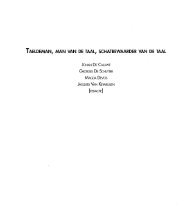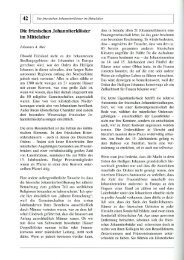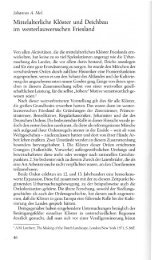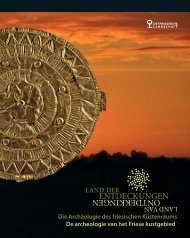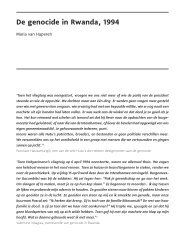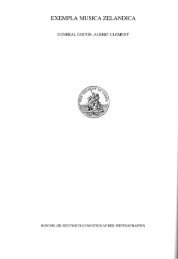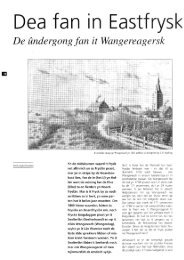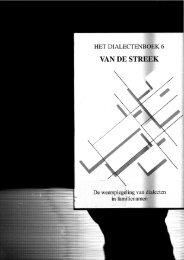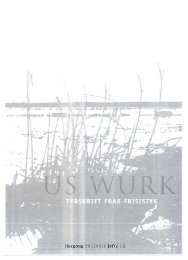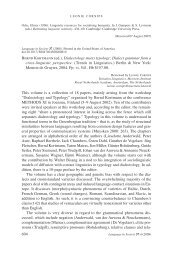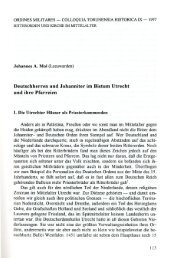Antropologen, historici en de hartslag van het archief
Antropologen, historici en de hartslag van het archief
Antropologen, historici en de hartslag van het archief
Create successful ePaper yourself
Turn your PDF publications into a flip-book with our unique Google optimized e-Paper software.
For Christi<strong>en</strong> and Daniel, and in loving memory of my par<strong>en</strong>ts<br />
2<br />
Rector, Ladies and G<strong>en</strong>tlem<strong>en</strong>,<br />
Archives are <strong>de</strong>ad. They may hold thousands or ev<strong>en</strong> millions of records, but it's all just stuff. As<br />
some Dutch burgomasters realised (or so the story goes), archives are perfect for filling up the<br />
local village ditch. And wh<strong>en</strong> building a subway - the way it was done in Cologne's medieval<br />
town c<strong>en</strong>tre - well, an <strong>en</strong>tire tunnel can be filled!<br />
Still, there is no shortage of historians who view archives in highly romantic terms. Ever<br />
since the days of Jules Michelet they dream of making the ink on parchm<strong>en</strong>t speak and, like<br />
Arlette Farge or Carolyn Steedman, they ev<strong>en</strong> write fine studies on such longings alone (Farge<br />
1989; Steedman 2001). Perhaps the most hopeless romantics (or animists, if you like) are the<br />
cultural historians, those who conceive of culture in broad, anthropological terms. Famous is the<br />
injunction of one of them, the English historian G. M. Young, 'to go on reading until you can<br />
hear people talking'. But anthropologists taking a long, historical view at culture like to animate<br />
the archive as well; for instance, the American anthropologist Ann Laura Stoler, who wrote at<br />
l<strong>en</strong>gth about the 'pulse' of the archive in her latest book on the Dutch East Indies. Scholars<br />
should learn to feel that pulse, to trace the affective strains hidd<strong>en</strong> in archival forms (Stoler<br />
2009).<br />
With anthropologists now haunting and ev<strong>en</strong> fetishising the <strong>de</strong>ad matter of archives, are<br />
there any distinctions left betwe<strong>en</strong> anthropology and history? As anthropologist W<strong>en</strong>dy James<br />
rec<strong>en</strong>tly observed, 'the question mainly in people's minds these days asks what is the differ<strong>en</strong>ce<br />
betwe<strong>en</strong> these disciplines, if any?' (James 2003: 298-99). She was certainly not the first to note<br />
the two disciplines' rapprochem<strong>en</strong>t.<br />
In the following pages I will trace some of the history of this striking converg<strong>en</strong>ce.<br />
However, knowing less about anthropology, I will not <strong>de</strong>lve <strong>de</strong>eply into Stoler's work and that of<br />
her colleagues, the historical anthropologists. Instead, I will conc<strong>en</strong>trate on the anthropological<br />
(or cultural) historians, on those who in their investigations of the everyday have consist<strong>en</strong>tly<br />
turned to social or cultural anthropology and, to a lesser <strong>de</strong>gree, to various related disciplines. 1<br />
1 I realise that the t<strong>en</strong>n 'historical anthropology' has oft<strong>en</strong> be<strong>en</strong> used to d<strong>en</strong>ote the latter category, but I prefer to<br />
keep the distinction as simple as possible. For various helpful overviews of the rapprochem<strong>en</strong>t looking mostly at the<br />
writings of anthropologists (discussing Boas, Kroeber, Bernard S. Cohn, Marshall Sahlins, Eric Wolf and many<br />
others), see Faubion 1993; Axel 2002; Dube 2007. The historical anthropology emerging in the 1970s in the<br />
Netherlands and strongly inspired by the writings of Norbert Elias still needs to be chronicled. But see Blok 1988<br />
and Blok 2001.<br />
3



